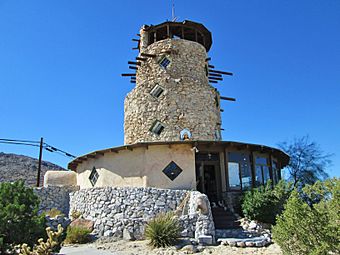Desert View Tower facts for kids
Quick facts for kids |
|
|
Desert View Tower
|
|
 |
|
| Nearest city | Ocotillo, California |
|---|---|
| Area | 5 acres (2.0 ha) |
| Built | 1922–1928, 1930s, 1950 |
| Built by | Bert Vaughn, M.T. Ratcliffe |
| Architectural style | Environmental Folk Art |
| MPS | Twentieth Century Folk Art Environment in California TR |
| NRHP reference No. | 80000801 |
| Added to NRHP | August 29, 1980 |
The Desert View Tower is a unique stone tower in Southern California. It sits high up in the In-Ko-Pah Mountains, about 3,000 feet (910 m) above sea level. This special place is near the towns of Jacumba and Ocotillo. It's also right next to parts of the old U.S. Route 80. The tower is a cool spot to visit and learn about the area's history.
Contents
Traveling Through the Desert
People have traveled through this desert area for many centuries. Early pioneers used this route to cross between Yuma and San Diego. Imagine crossing this tough land in wagons pulled by oxen!
In 1856, Lieutenant E.B. Williston made an early trip. He traveled from San Diego, through a small part of Mexico, then up through Jacumba to Yuma. This was one of the first times people used wheeled vehicles here.
Mountain Springs Station
Near the tower, there's an old stone house. It was called the Mountain Springs Station. From 1862 to 1870, it was a store. Ox teams would pull wagons up a very steep hill from here.
Later, in 1915, the Old Plank Road was built. This helped early cars cross the sandy desert more easily.
Building the Tower
The Desert View Tower is made of stone. It was built over several years, starting in 1922. A man named Bert Vaughn, who owned the town of Jacumba, started the project.
Vaughn built the tower to honor the brave pioneers. He also wanted to remember the people who built the highways and railroads. These builders helped open up the area for more travel.
The tower is five stories tall. It has a museum inside where you can learn more about the area. At the very top, there's an observation deck. From there, you can see amazing views of the desert. A gift shop was added later at the bottom of the tower.
Boulder Park: Art in Stone
Right next to the Desert View Tower is a special place called Boulder Park. Here, you'll find sculptures of animals and other figures. These were carved right into the local stones!
A man named Merle Ratcliff created these sculptures. He worked on them for two years during the 1930s. This was a time called the Great Depression, when many people didn't have jobs. Both the tower and Boulder Park are considered "folk art." This means they were made by ordinary people, not trained artists, and show the spirit of the local culture.
A Historic Landmark
The Desert View Tower and Boulder Park are very important. They were added to the National Register of Historic Places on August 29, 1980. This means they are recognized as special places that should be protected. They are part of a group of "Twentieth Century Folk Art Environments in California."
 | Bessie Coleman |
 | Spann Watson |
 | Jill E. Brown |
 | Sherman W. White |



